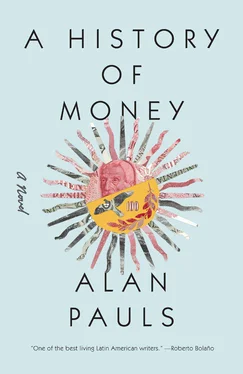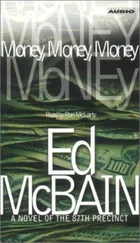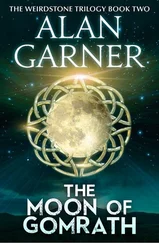That’s the best-case scenario. In the worst, which is also the most frequent when the country is caught in the centrifugal force of a so-called inflationary spiral, the money is lost and disappears forever, is swallowed by the common ocean and only reminds the world of its existence when its owner — who awaits it anxiously for the agreed period and then, once that’s over, carries on waiting in vain for weeks or months more, knocking on doors that never open, dialing disconnected phone numbers, hunting down employees who are stunned by this madman they’ve never seen before — realizes that he’s lost it all, leaves his jacket folded neatly on a bench at the station, and hurls himself onto the subway tracks. More than once during those five months, after being startled by the parade of bloodbaths he reads about in the newspapers — bankruptcies, banks folding, fugitive directors of finance companies, small investors who’ve been conned rioting until the police come and disperse them — he begins to feel a little like that furious man holding his hand to his forehead like a visor and desperately searching the open sea for some trace of his money. If he isn’t that man, if he just feels like him, that’s only because his father knows how to calm him down. His father brings the subject up before he does, as a topic of conversation rather than a source of terror, talking about the cash with a mixture of nostalgia and admiration, as though remembering a much-loved and very sensible relative who at a certain age decided on a change of life and is now the center of all manner of thrilling intrigues in far-off countries, which will change them forever but from which they’ll return safe and sound and even improved, stronger, capable now of facing the monsters they once fled. And having brought it up unbidden, he abandons it again just as easily, filing it away and returning to the routine they’ve shared for twenty years: a while at the office, then lunch at the fake Italian restaurant at Esmerelda and Córdoba, coffee in a bar at Florida and Paraguay, his rounds of airlines, agencies, and currency exchanges, a visit to the bookshop in the basement of the Jardín mall, goodbyes in Plaza San Martín.
Seeing him going about his business so naturally, his fears dissolve. He figures none of this could be happening if his money were in danger. At least one habit would have to change. His father wouldn’t eat as quickly as he always does, pitting himself against an invisible opponent. He wouldn’t clean his plate with little pieces of bread and then throw them in his mouth. He wouldn’t joke about soccer with the maître d’. He wouldn’t leave his customary exorbitant tips. He wouldn’t stop to look at shoes in a shop window. He wouldn’t discuss the Finance Ministry’s announcements in the distant, sarcastic tone of someone who knows they don’t apply to him, as though he came from a foreign country. Somehow this energetic, slightly restless normality soothes him. No matter what happens, things always find a way to run their own course. And so he ends up forgetting about the money, and when he’s reminded of it by something he wants or suddenly realizes he needs, something that costs more than he carries in his pocket or keeps in the old shoebox in his wardrobe, the blow has a visible effect on him, and he feels a stab of frustration, but his discomfort eases as soon as he sees this missing money for what it is: a homeland he’s had to leave for reasons of force majeure, though he remains committed to it and it awaits him with open arms, more opulent than ever.
This lasts for five months. Until one day while getting out of a taxi his mother realizes that, as usual, she doesn’t have any small change — a phrase she uses only when she’s the one who doesn’t have it — and asks him to pay, and then has a sudden moment of illumination right there on the sidewalk and asks him if he shouldn’t be getting his money back right around now. At the time, he lets himself be drawn in by the mockery poisoning his mother’s tone, and then ignores it in order to take his mind off his fear, just like he does every time something shocks him. But later, when they’ve said their goodbyes and his mother turns and begins to walk away slowly, with her already slightly tired gait, her arms hanging almost still by her sides, and her head held low, as soon as he’s safely out of her sight, the first thing he does is open his diary and flick as fast as his anxious fingers will go through days already lived, bills paid, and bar napkins full of to-do lists that he emptily promises himself he’ll transfer to the diary, until finally he’s looking at the page for that day and at the crucial hour ringed with a fluorescent circle and surrounded by large exclamation marks, like an inspired chess combination — and he discovers that his mother is right. Today’s the day. How, why she’s so mindful of the date he’s supposed to get his money back, even though he thought he’d taken great care to keep this information from her, having foreseen the toxic use she could make of it, he doesn’t know. His mother always seems to be bragging that she knows everything about his father and him, the double act that comes together as rapidly as the marriage breaks down (which is to say very rapidly), and in particular that she knows all about the things they hide from her, that she knows about them before they’ve even happened, and though she often gets it wrong and ends up putting two and two together and getting five, and taking as given things that exist only in her own imagination, he’s not insensible to the conviction with which she lets him know that she knows; it always makes him founder and doubt himself, makes him double- and triple-check things he was sure of, things he’d confirmed seconds before meeting her. This is probably the only thing she has left of the unfortunate, fleeting kingdom the three of them once shared, and she carries it everywhere with her: a certain bent for suspicion; the desire to know what the enemy is plotting.
Ten days later, he has the money again — in cash. He doesn’t get it back at once, all together, as he had expected, but rather bit by bit, in four installments, first two small ones, wrapped in newspaper, and then two larger ones in brown paper bags, some of it in heaps of Argentine money, some of it in dollars, the smallest and most wrinkled notes mixed with larger, newer ones, among them some so new and so crisp that he wonders whether he’s being given freshly counterfeited money. They’re rapid transactions, with no preamble nor any particular show of emotion, which his father carries out as if he doesn’t want to leave any trace of them, briskly and in all the normal settings: the office; a bar full of cooking smells and staff with dandruff gesticulating in their shirtsleeves; even the street door to his building, where his father briefly stops the taxi he’s passing in, hands him the final packet of cash through the window, without getting out, and goes on his way, giving him no time to react, not even to say thank you. Broken up like this, the handover leaves a vaguely disappointing taste in his mouth. Which isn’t so bad, after all that’s happened. As is often the case with trivial but unexpected feelings, which can eclipse much stronger but more predictable ones simply because they come as a surprise, the disappointment dulls and dispels his anxiety, which is what he should reasonably have felt when his father originally told him that the return of his money would be staggered. But the urgent, scatterbrained, sloppy nature of the collection also blunts his relief at having recovered the money and, more importantly, the happiness he should feel at the miracle of its multiplication. He has almost three times what he started with, much more than anyone else could or does make by putting the same initial amount in a bank at the same time, while he gets his fingers dirty counting his small fortune. It’s a pity that the miracle withers a little when he spreads the cash out on the table and contemplates an assortment of piles, sizes, colors, currencies, and textures that don’t go together and will never — and this is what makes him saddest — have the unity, the wholeness of the original bundle of dollars, scrawny as it was.
Читать дальше












